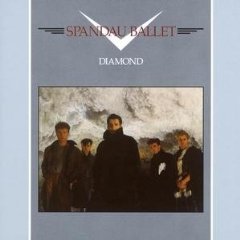How was it that the 80s opened with such shocking invention and manifesto-led movement in its Top 10, only to slump down on the soft furnishings of Johnny Hates Jazz and Clothes Show Live exhibitions within a few years? For those of us who were in nappies when Spandau Ballet stepped out in kilts, these first two LPs provide some intriguing pointers. Well-worn narratives about the decade aside — yes, the New Pop project crashed in 1983; no, the band weren’t Thatcherite ideologues — Spandau acted as an index of pop currency, for better and (much, much) worse.
This made them initially weirder than we could ever have dreamed. Both mod-lineage club kids and stage school opportunists, Kemp’s crew were a self-made boy band who dressed as sci-fi Cossacks and knocked out sharp club-and-chart classics before becoming Partridge fodder a year or two later. That magpie eye for the latest schmutter was also at work in their music; you can hear them playing dress-up with the sounds of The Associates, Magazine and Kid Creole, without grasping — or perhaps caring — what made those acts tick. It’s easy to see why, during pop’s most successfully aesthetic and politically engaged period, they would get the skunk-eye from people who’d genuinely never had it so good. Spandau Ballet would never capture the authentic sleaze at the heart of Soft Cell or Visage; their admirably outlandish wardrobes didn’t say anything, while Boy George’s did; where Simple Minds’ pose and pretension had a heroic purity, theirs was too ‘look-book’ tentative. Even as narcissistic hedonists they were outstripped by the more explicitly shameless Duran Duran. But they did have a keen sense of what pushed the buttons in their native club culture — sound as sensation, image as flash-bulb glimpse of self-reinvention — and those hammy songwriting principles stayed slave to the rhythm, at first. Haters dragged along to see them play had to admit they were great.
One major obstacle to giving Spandau Ballet a fair go remains, in the obstinate form of Tony Hadley. Hadley, once the nation’s second favourite novelty mic controller after Wogan in his Blankety Blank pomp. Hadley, who in contrast with his anti-Thatcher, miner-supporting bandmates would cash in his remaining celebrity chips endorsing the 2005 Conservative Party election campaign. ("We will build however many prisons we need" he promised, apparently unaware of the irony.) Hadley, who is currently described on his Wikipedia page as ‘an enthusiast for beer’. You wonder how exciting a clientele Blitz et al actually had if Spandau couldn’t recruit a better candidate from among their ranks.
But on Journeys to Glory you can just about hear why they stuck to their guns. Or rather, you can’t: the better his hybrid holler-croon is hidden, the better they sound; it takes a lot of smoke and perfume to cloak that karaoke-champ audio halitosis. Surprisingly, he’s just the right guy to declare "I am beautiful and clean and so very, very young" against the winding, waspish riff and laser-shot rhythm of ‘To Cut A Long Story Short’; a match for its cruel momentum. But the slinkier ‘Musclebound’ could do with less of his bellowing; he only exposes the fact that, lyrically, it’s a quasi-Stalinist ‘Stone Henge’ and distracts from the wallop in the rhythm section. What could have been bravely homoerotic pop can’t quite shake the feel of ‘Russian’ music as performed in a school play. He’s back at home on the jump-up punk-funk of ‘The Freeze’, though, which bites Blondie’s ‘Atomic’ and outstrips Franz Ferdinand.
The best thing about these reissues is the inclusion of the 12" versions, which stretch out the space and push forth the groove. If DFA released the astringent remixes of ‘The Freeze’ or the clattery, smartly dubbed extended ‘Story’ and ‘Glow’ tomorrow, by Friday a thousand bloggers would have hailed each as the best thing they’ve put out since ‘Losing My Edge’. Beyond the singles, though, Journeys to Glory flies by, and usually falls on, the seat of its preposterous pantaloons. Filler like ‘Reformation’ (the diminutive, jerky-dancing wingman of ‘Story…’) does have a cheeky period charm. But the likes of ‘Mandolin’ and the candid ‘Confused’ — messes of discofied early Cure, honking vox and naïve synths that would better suit a kids’ TV programme — are every bit as dreadful as you’d expect.
New year, new look; similar highs and lows. By 1981 August Darnell had become an obvious inspiration — high-waisted suits all round (on the inner sleeve shots, Martin Kemp even boasts an absurdly long key-chain in tribute to the great man’s watch chain) and conga-happy funk overtaking the Euro frostiness. Again, the Diamond reissue is all about the singles: ‘Chant No 1’ is the funkiest soundtrack to summer riots a boy band ever made; the slap bass triumphalism of ‘Instinction’ too vertiginous to brook quibbles about daft lyrics; ‘Paint Me Down’ treads tropical water but keeps you dancing. And again, they’re all at their best stretched out to 12 inches. Meanwhile, Wham!-style holiday funk of ‘Coffee Club’ aside, the album tracks are stranger still than those on their debut. ‘She Loved Like Diamond’ introduces pastel tones that allow Hadley to encroach like a hapless dictator; but on stripped-down minimal funk mover ‘Pharoah’ he follows the guitar melody like a man with a gun to his head — much better. There are bolder departures too: obviously hip to Ryuichi Sakamoto, Spandau ‘go oriental’ on the quite-pleasant-really ‘Innocence and Science’. Which must have made it about time to rip off Japan, hence the fretless bass and fretful lyrics of ‘Missionary’; you can imagine how the ham-throated Hadley compares with David Sylvian’s honeyed mystique.
Where could Spandau Ballet have gone next? They’d either have to invent cocktail gamelan, or take it back to the old (stage) school — and we know all too well which route they took. But compare ABC’s ‘Look of Love’ and ‘All of My Heart’ with Spandau’s 1983 megahits ‘Gold’ and


